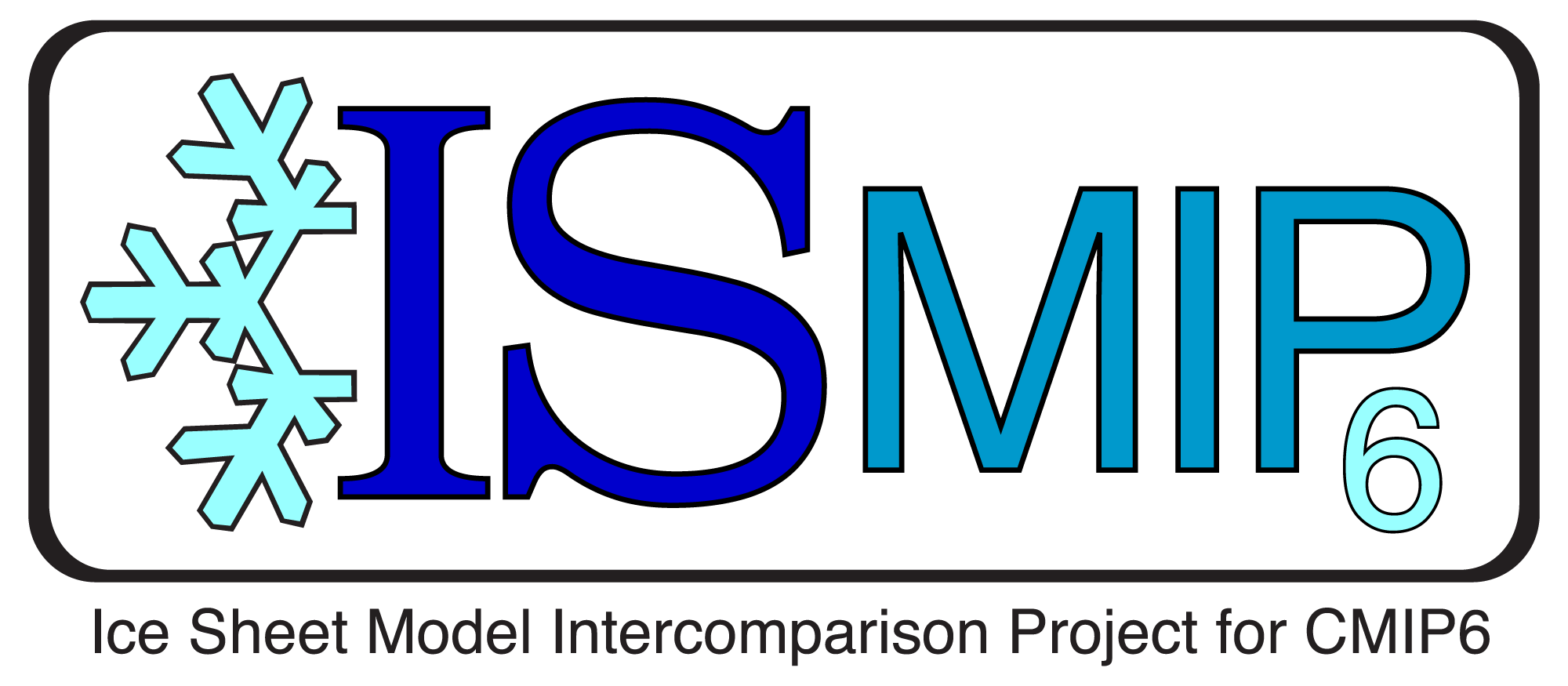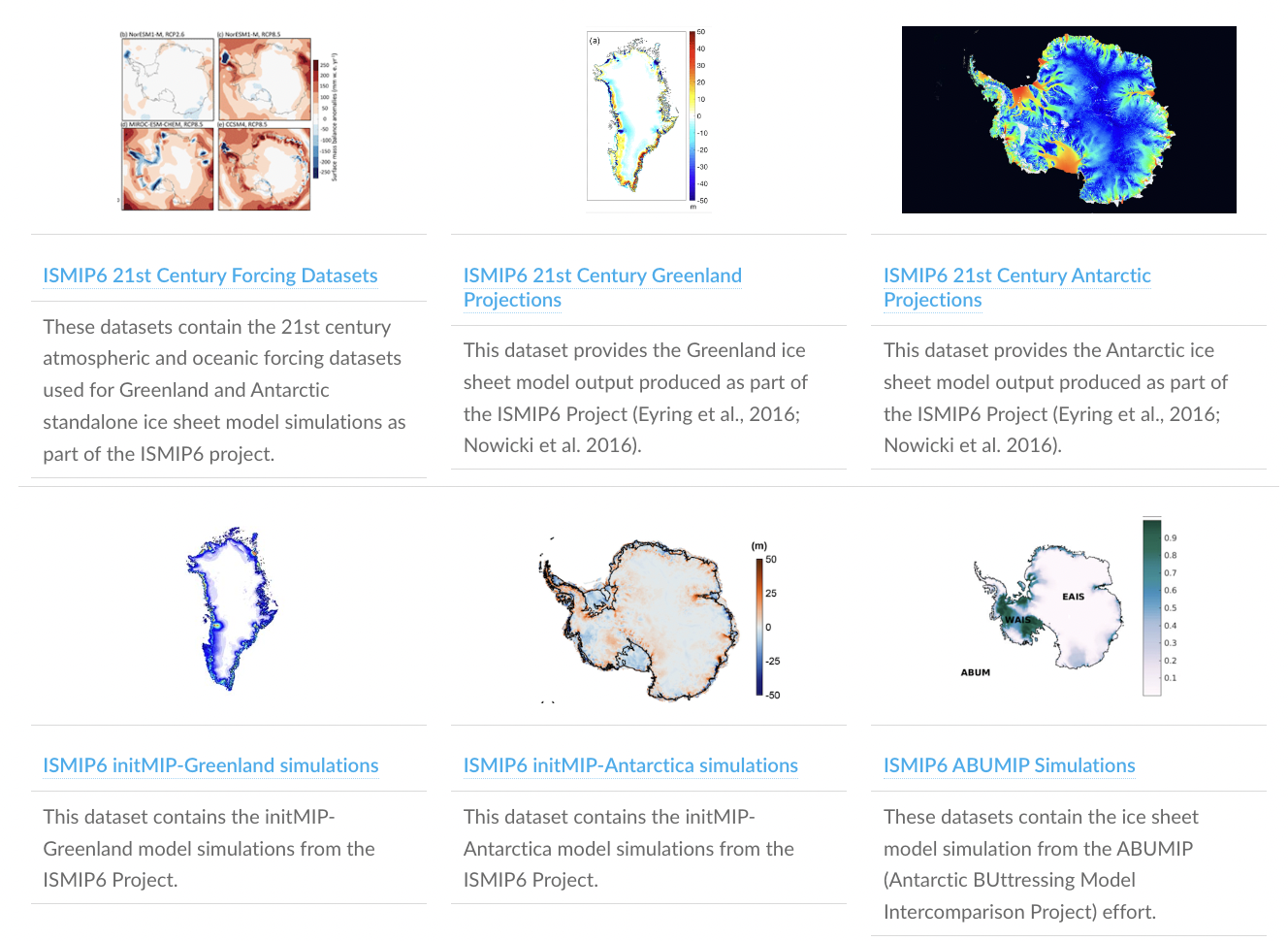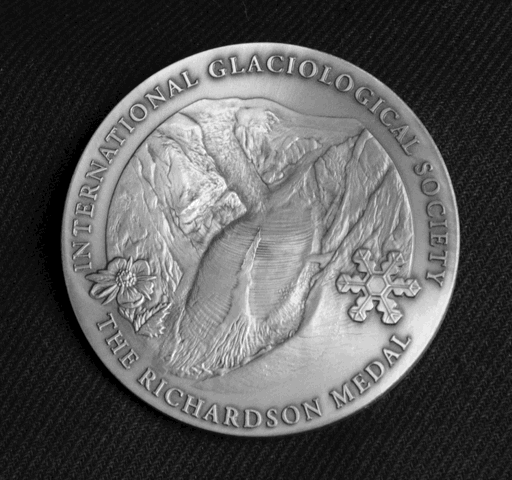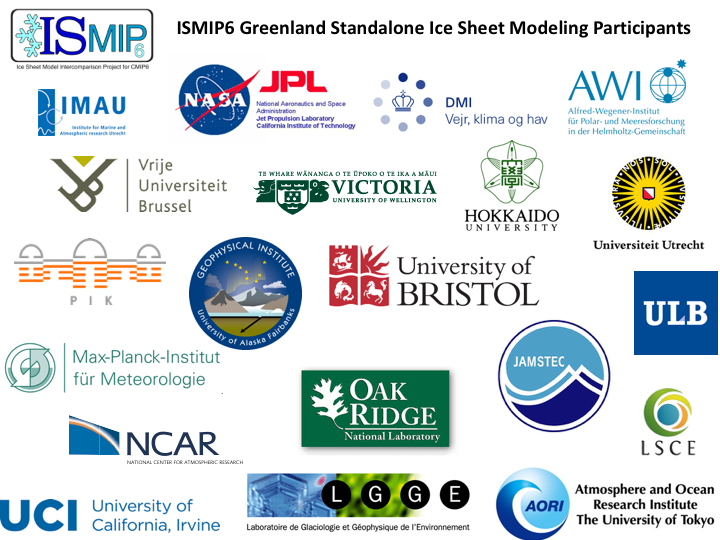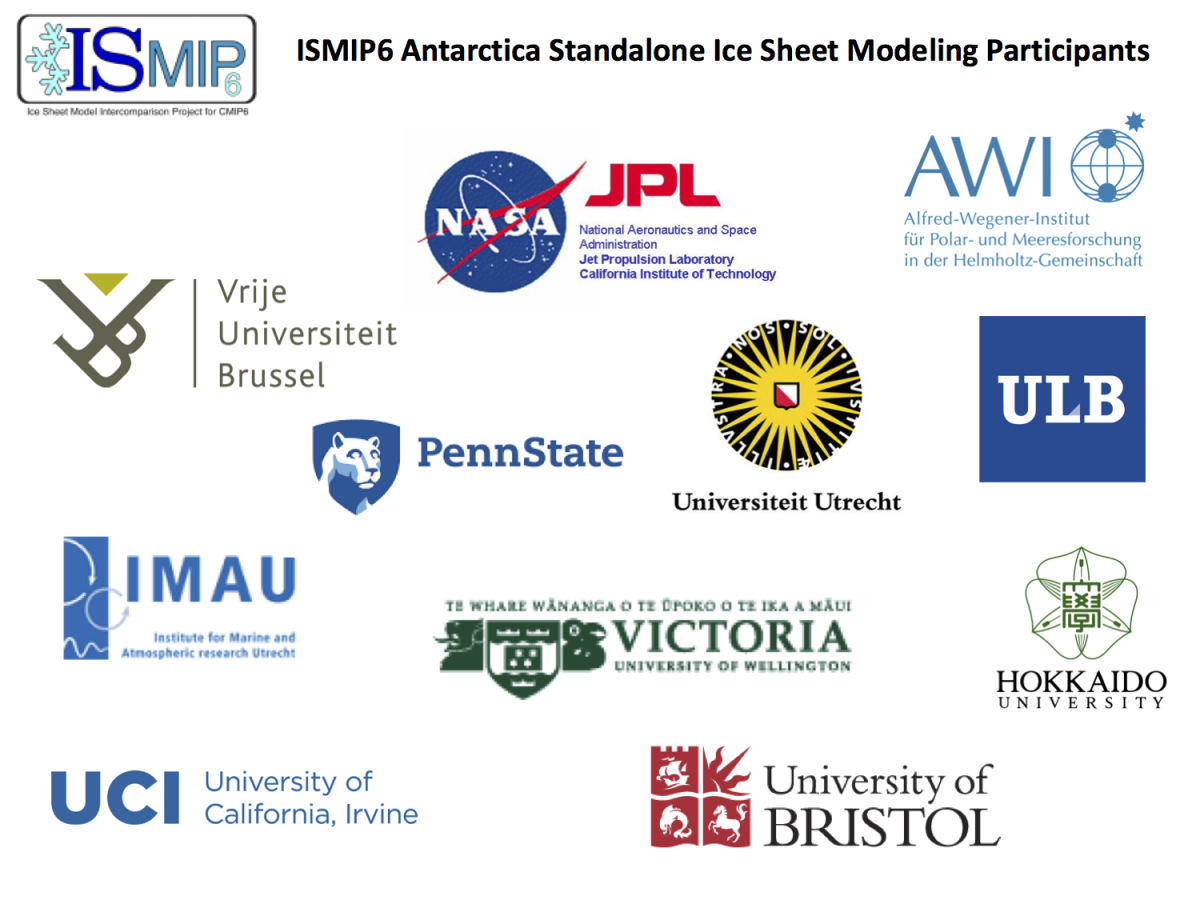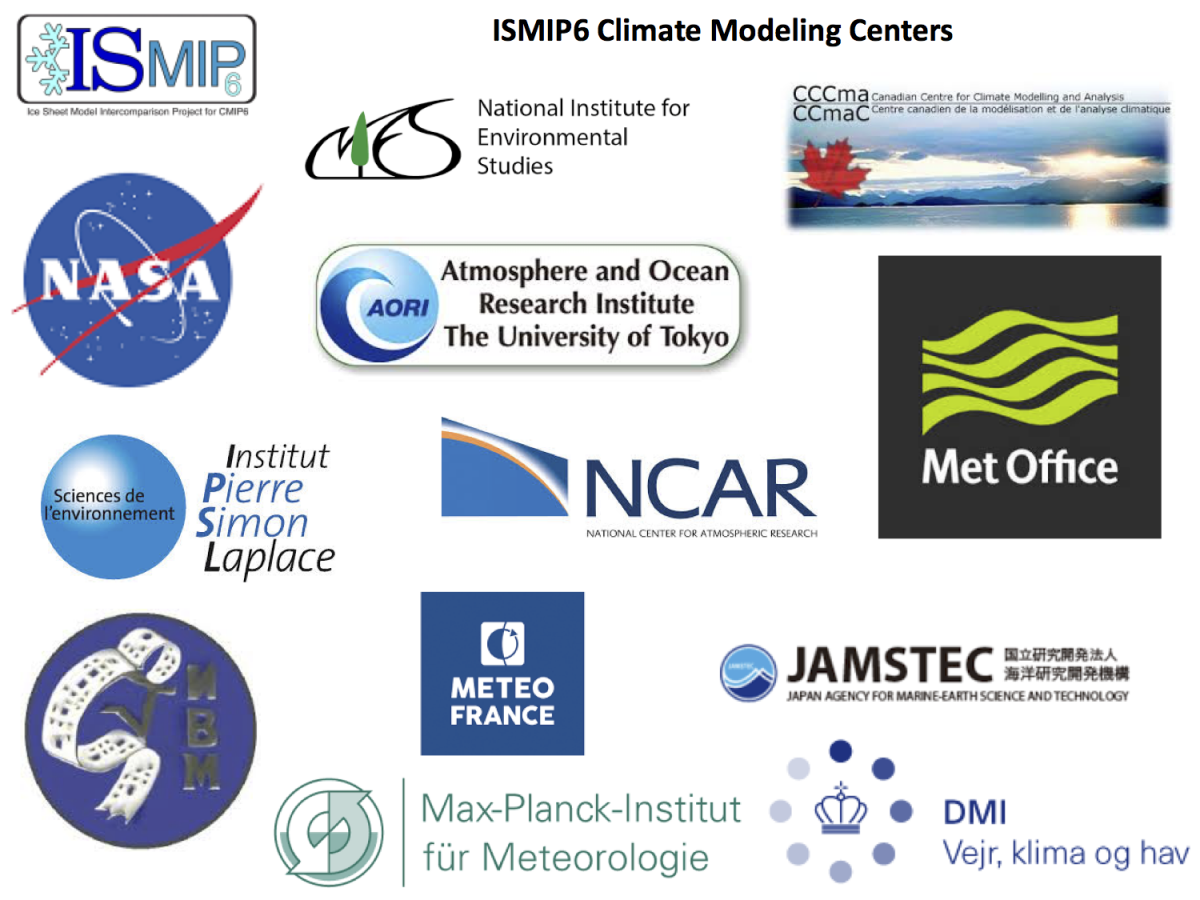Welcome to the Ice Sheet Model Intercomparison Project for CMIP6 (ISMIP6) wiki
You are encouraged to use the wiki pages to alter the formulation of numerical experiments, point out any inconsistencies or inaccuracies you find in the data sets, and post results and figures that you’d like others see and discuss.
New Updates
The planning for ISMIP7 has started! Let us know at ismip6-at-gmail.com if you want to be involved! We will be revisiting every aspect of the ISMIP6 protocol and see how it can be improved… Of course, we are also tied to the CMIP7 protocols and IPCC AR7 schedules, which are themselves being worked on…We transitioned from Climate and Cryosphere (CliC) wikis to Ghub. Please reference resources from this group, as they reflect the latest materials.
Current Activity
ISMIP6 Antarctic 2300 projections. These projections focus on simulations of the Antarctic Ice Sheet extended to year 2300. These new experiments were launched in February 2022. More details are available on the ISMIP6-Projections2300-Antarctica wiki.
Meetings
The ISMIP6 Meetings wiki indicates when and where our next meeting will be! In 2023, we are planning meetings at IUGG in Berlin, INSTANT SCAR in Trieste, and AGU in San Francisco.
Accessing Wikis
To access all wikis, resources, and datasets, please refer to the Index tab in the top right corner.
What is ISMIP6?
The overall framework for ISMIP6 is designed to deliver projections of ice sheet contribution to sea level rise. ISMIP6 brings together for the first time a consortium of international ice sheet models and coupled ice sheet-climate models. This effort thoroughly explores the sea level contribution from the Greenland and Antarctic Ice Sheet in our changing climate and assess the impact of large ice sheets on the climate system. Together with the new glacier Climate and Cryosphere (CliC) targeted activity and projections of thermal expansion within the Coupled Model Intercomparison Project (CMIP) framework, sea level is now part of the family of variables for which CMIP can provide routine IPCC-style projections.
ISMIP6 is explicitly designed to
(1) Ensure that ice sheet (hence sea level) projections are fully compatible with the CMIP6 (Coupled Model Intercomparison Project-Phase 6) process, and
(2) Provide the basis for investigating the feedbacks, impacts, and sea level changes associated with dynamic ice sheets and for quantifying the uncertainty in ice-sheet-sourced global sea level change.
Our contributed experiments to CIMP6 (Nowicki et al., 2016) both use and augment the Diagnostic Evaluation and Characterization of Klima (CMIP6-DECK), Historical and ScenarioMIP experiments. ISMIP6 uses the standard CMIP Atmosphere General Circulation Models (AGCM) and Atmosphere-Ocean General Circulation Models (AOGCM) experiments for analysis of the climate over and surrounding the ice sheets, and as forcing for the standalone ice sheet models (ISM) projections. Additional sensitivity experiments were performed with the ISM to investigate the uncertainty associated with these projections arising from ice sheet models.
The key output is an ensemble of historical and future estimates of ice sheet contribution to sea level. To address the climate feedbacks introduced by interactive ice sheets, we proposed that a small number of selected DECK experiments are repeated with coupled AOGCM-ISM, where the ice sheet is an interactive component of the AOGCM. Our assessment of the state of existing AOGCMs is that coupled models including an interactive Greenland ice sheet can realistically be expected for CMIP6. However, including the Antarctic ice sheet in the aforementioned models remains a challenge due to the inherent complexity of its response to climate forcing, and the issues associated with simulations of the Southern Ocean). It is for these reasons that ISMIP6 (Nowicki et al., 2016) heavily relies on standalone ice sheet models driven offline by CMIP6 climate models for projections of sea level.
Refer to the sections below for more information on ISMIP6 experiments, model simulations, modeling center, and participants
ISMIP6 Primary Experiments
Standalone Ice Sheet Experiments
These pages describe the experimental setup for the standalone ice sheet model simulations. ISMIP6 standalone ice sheet modeling focuses on:
- Gaining insight into the uncertainty in ice sheet evolution resulting from the choice of initialization methods (the initMIP efforts for the Greenland and Antarctic ice sheets)
- Understanding the response of the Antarctic ice sheet to a total loss of the ice shelves (ABUMIP), as well as
- Projecting ice sheet evolution for the 21st century
ISMIP6 managed its goal of delivering projections from dynamic ice sheet models in time for IPCC AR6. Because of the delay in CMIP6 and the availability of dataset from CMIP6 climate models, many of the core simulations for the Greenland and Antarctic ice sheet had to use CMIP5 datasets.
Greenland
| initMIP-Greenland | focuses on detailed description of the ISMIP6 Standalone Ice Sheet experiments for the initialization for Greenland. |
| ISMIP6-Projections-Greenland | focuses on detailed description of the ISMIP6 Standalone Ice Sheet experiments protocols for projections of the Greenland ice sheet evolution. |
Antarctica
| initMIP-Antarctica | focuses on the more detailed description of the ISMIP6 Standalone Ice Sheet experiments for the initialization for Antarctica. |
| ABUMIP-Antarctica | focuses on understanding the response of the Antarctic ice sheet to weakening and loss of the shelves. |
| ISMIP6-Projections-Antarctica | focuses on detailed description of the ISMIP6 Standalone Ice Sheet experiments protocols for projections of the Antarctic ice sheet evolution. |
| ISMIP6-Projections2300-Antarctica | focuses on detailed description of the ISMIP6 2300 Projections experiments protocols for projections of the Antarctic ice sheet evolution extended to 2300. |
Coupled Ice Sheet Climate Experiments
| ISMIP6-Coupled-Ice-Sheet-Climate-Experiments | describes the experimental setup for the coupled ice sheet-climate model simulations. |
Datasets
The CMIP5 and CMIP6 climate datasets used by ISMIP6 for its projections are distributed via Ghub. A quality controlled dataset on the standard ISMIP6 grids for the initMIP Greenland and Antarctica efforts, the ABUMIP, and the 21st century Greenland and Antarctica projections are all available and described in detail on our Browse Data page.
ISMIP6 datasets are distributed via the ‘Ghub Globus endpoints. ISMIP6 2300 Antarctic ice sheet forcing dataset will be given access on individual request to ISMIP6. To receive access to the dataset, please send to ISMIP6 your Globus credentials. These can take the form of your Globus email, gmail, or ORCID. A Ghub account is ONLY required with the other ISMIP6 datasets distributed via Ghub. These datasets are from earlier ISMIP6 activities, such as the initMIP, ABUMIP, or projections to 2100. ISMIP6 and GHub is partnered with UB CCR to provide access to large datasets. The Datasets-for-whole-ice-sheet-models page provides suggestions for datasets that are used in the initialization of ice sheet models, but you can use different datasets and still participate in ISMIP6.
These ISMIP6 datasets are freely available, however, we ask that ISMIP6 and its participants are acknowledged in publications and presentations. Suggestions on how to do this can be found in the for ISMIP6 publications Guidance for ISMIP6 publications.
ISMIP6 and Richardson Medal
In March 2023, ISMIP6 was recognized for its outstanding service to the field of glaciology and sea level projection by the International Glaciology Society via the first Richardson Medal ever given to a team. The award announcement reads:
“We recognize the entire ISMIP6 team for its academic and leadership activities in the design and production of future sea-level projections. The ISMIP6 team, consisting of over 80 members, has provided outstanding service to the field of glaciology by planning and coordinating projections of ice-sheet change. The ISMIP6 team has been instrumental in providing a community-led response to two WCRP Grand Challenges: “Melting Ice and Global Consequences” and “Regional Sea Level Change and Coastal Impacts”. Although ice-sheet model comparisons have a long history in the field of glaciology, dating back to the EISMINT experiments in the 1990s, the atmospheric, oceanic and other climate communities have made significant advances through the suite of CMIP simulations that form the basis of sections of the IPCC report. The ISMIP6 team was responsible for collaborative design and interpretation of the ensemble of model runs used for projections of future ice-sheet change and bringing the ice-sheet community under the auspices of the international CMIP community. As part of this, the ISMIP6 team has been instrumental in building international collaborations that span career stages and nations. Their projections have had a wide impact on the global community, serving as the basis for policy and adaptation discussions. We recognize the impact and leadership provided by the entire ISMIP6 team and its service to the glaciological and wider communities.”
ISMIP6 Participants
ISMIP6 is a community effort that involves scientists interested in the polar regions, ranging from experts in polar remote sensing to modeling. If you would like to be involved in ISMIP6, please email ismip6-at-gmail.com.
The co-chairs of steering committee for ISMIP6 includes Sophie Nowicki, Eric Larour, and Tony Payne. The steering committee members are Helene Seroussi, Heiko Goelzer, Andrew Shepard, William Lipscomb, Jonathan Gregory, and Ayako Abe Ouchi. A big thank you to our members contributing to the numerical simulations!
Greenland Standalone Ice Sheet Modeling
| Contributors | Model | Group ID | Group |
| Nick Golledge | PISM | ARC | Antarctic Research Centre, Victoria University of Wellington, NZ |
| Martin Rückamp,Angelika Humbert | ISSM | AWI | Alfred Wegener Institute for Polar and Marine Research, DE /University of Bremen, DE |
| Victoria Lee, Tony Payne | BISICLES | BGC | University of Bristol, Bristol, UK |
| Christian Rodehacke | PISM | DMI | Danish Meteorological Institute, DK |
| Ralf Greve | SICOPOLIS | ILTS | Institute of Low Temperature Science, Hokkaido University, Sapporo, JP |
| Ralf Greve, Reinhard Calov | SICOPOLIS | ILTS_PIK | Institute of Low Temperature Science, Hokkaido University, Sapporo, JP / Potsdam Institute for Climate Impact Research, Potsdam, DE |
| Heiko Goelzer, Roderik van de Wal | IMAUICE | IMAU | Utrecht University, Institute for Marine and Atmospheric Research (IMAU), Utrecht, NL |
| Helene Seroussi, Nicole Schlegel | ISSM | JPL | NASA Jet Propulsion Laboratory, Pasadena, USA |
| William Lipscomb, Joseph H. Kennedy | CISM | LANL | National Center for Atmospheric Research, Boulder, CO, USA / Oak Ridge National Laboratory, USA |
| Fabien Gillet-Chaulet, Olivier Gagliardini | Elmer | LGGE | Laboratoire de Glaciologie et Géophysique de l’Environnement, FR |
| GRISLI | LSCE | Laboratoire des sciences du climat et de l’environnement, FR | |
| Fuyuki Saito, Ayako Abe-Ouchi | IcIES | MIROC | Japan Agency for Marine-Earth Science and Technology, JP / The University of Tokyo, Tokyo, JP |
| Florian Ziemen | PISM | MPIM | Max Planck Institute for Meteorology, DE |
| Andy Aschwanden | PISM | UAF | Geophysical Institute, University of Alaska Fairbanks, USA |
| Helene Seroussi, Mathieu Morlighem | ISSM | UCIJPL | NASA Jet Propulsion Laboratory, Pasadena, USA / University of California Irvine, Irvine, USA |
| Sainan Sun and Frank Pattyn | FETISH | ULB | Laboratoire de Glaciologie, Université Libre de Bruxelles, Brussels, BE |
| Philippe Huybrechts, Heiko Goelzer | GISM | VUB | Vrije Universiteit Brussel, Brussels, BE |
Antarctica Standalone Ice Sheet Modeling
| Contributors | Model | Group ID | Group |
| Nick Golledge | PISM | ARC | Antarctic Research Centre, Victoria University of Wellington, NZ |
| Thomas Kleiner, Johannes Sutter, Angelika Humbert | PISM | AWI | Alfred Wegener Institute for Polar and Marine Research, DE /University of Bremen, DE |
| Stephen Cornford | BISICLESPRELIM | CPOM | University of Bristol, Centre for Polar Observation and Modelling, UK |
| Christian Rodehacke | PISM0 | DMI | Danish Meteorological Institute, Arctic and Climate, DK |
| Fabien Gillet-Chaulet | ELMER | IGE | Laboratoire de Glaciologie et Géophysique de l’Environnement, FR |
| Ralf Greve | SICOPOLIS | ILTS | Institute of Low Temperature Science, Hokkaido University, Sapporo, JP |
| Heiko Goelzer, Roderik van de Wal, Thomas Reerink | IMAUICE64 | IMAU | Utrecht University, Institute for Marine and Atmospheric Research (IMAU), Utrecht, NL |
| Nicole Schlegel, Helene Seroussi | ISSM | JPL | NASA Jet Propulsion Laboratory, Pasadena, USA |
| Stephen Price, Matthew Hoffman, Tong Zhang | MALI | LANL | Los Alamos National Laboratory, Los Alamos, USA |
| Aurélien Quiquet, Christophe Dumas | GRISLI | LSCE | Laboratoire des Sciences du Climat et de l’Environnement,Université Paris-Saclay, France |
| William Lipscomb, Gunter Leguy | CISM | NCAR | National Center for Atmospheric Research |
| Torsten Albrecht | PISM3PAL | PIK | Potsdam Institute for Climate Impact Research, DE |
| David Pollard | EQNOMEC,GLNOMEC | PSU | Pennsylvania State University EMS Earth and Environmental Systems Institute, Pennsylvania, USA |
| Helene Seroussi,Mathieu Morlighem | ISSM | UCIJPL | NASA Jet Propulsion Laboratory, Pasadena, USA / University of California Irvine, Irvine, USA |
| Sainan Sun and Frank Pattyn | FETISH | ULB | Laboratoire de Glaciologie, Université Libre de Bruxelles, Brussels, BE |
| Jonas Van Breedam, Philippe Huybrechts | AISMPALEO | VUB | Vrije Universiteit Brussel, Brussels, BE |
Climate Modeling Centers
Climate modeling centers that have expressed an interest in ISMIP6.
| Climate mode | Ice-sheet model | Institute/country |
| CanESM | None | CCCma/CA |
| CESM2 | CISM | NCAR-LANL/USA |
| CNRM-CM | GRISLI | CNRM/FR |
| EC-Earth | GrIS | DMI/DK |
| GISS | PISM | NASA-GISS/USA |
| INMCM | VUB | INM/RU |
| IPSL-CM6 | GRISLI | IPSL/FR |
| MIROC-ESM | IcIES | AORI-UT-JAMSTEC-NIES/JP |
| MPI-ESM | PISM | MPI/DE |
| UKESM | BISICLES | MetOffice/UK |


